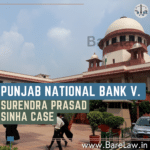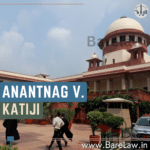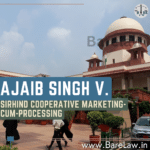
Table of Contents
R Kempraj v Burton Son & Co, AIR 1970 SC 1872 | BareLaw
Supreme Court of India has decided on the critical question whether options for renewal of lease are within the definition of the rule against perpetuity as given in Transfer of Property Act, 1882. This paper explores the background, legal issues involved, judgment by the court and its implications on property law and lease agreements.
Introduction:
R.Kempraj vs Burton Son & Co is an important Indian Supreme Court case which deals with how the rule against perpetuity applies to a lease agreement. This precedent setting judgment clarifies legal positions regarding rent renewals and their contractual obligation.
Background and Facts:
In 1951, Kempraj Shah rented out premises at Bangalore to Burton Son and Company for ten years with option to renew on same terms for further periods of ten years each. When there was a request for renewal in 1961, Kempraj refused to extend it thus prompting Burton Son and Company to sue him for specific performance. The case reached Supreme Court through special leave from trial court decreeing this suit as also first appellate court along with high court .
Legal Issues and Contentions:
The main issue was whether renewal clause in lease fell foul of Rule Against Perpetuity under Section 14 Transfer Property Act, 1882. The appellant contended that this condition violated this rule while study of English law doctrine “Covenant that runs with land” having regard to our law.
Supreme Court‘s Decision and Rationale:
The Supreme Court upheld the decision below requiring specific performance of the covenant for renewal contained in a lease. The learned judges held that only when there is a transfer of property giving rise to vested interest appears can Rule Against Perpetuity be invoked but not here where no such an interest was created under this covenant in lease agreement hence did not fall within ambit section 14. The court observed that; although burden of covenants run with land according to S40 TPA; it does not create an easement or any kind of interest in the land subjected to such a covenant.
Implications and Analysis:
This judgment is essential for the interpretation of lease renewals under the rule against perpetuity. It states that the lease renewal conditions as contractual obligations do not give rise to property interests, making them outside the scope of rules against perpetuity. This clarification enables balance between property rights and freedom to contract, thereby protecting both society and property.
Conclusion:
R. Kempraj v. Burton Son & Co is a leading case in property law particularly in relation to understanding leases and how they correspond with the rule against perpetuity. The case demonstrates how property law changes over time vis-à-vis commercial laws and contracts.





